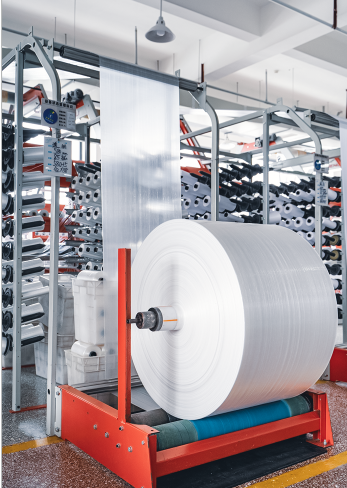PE liners cost less and protect against moisture and basic contamination. Aluminum foil liners cost more but provide complete barriers against oxygen, light, and chemicals Choose PE for bulk bags holding construction materials or basic products. Choose aluminum foil for food, pharmaceuticals, or expensive materials where contamination costs thousands.
Liners are protective plastic sheets that go inside your bulk bags to create an extra barrier between your materials and the outside world. They prevent moisture, contamination, and other problems that can ruin expensive products.
The two main types work differently. PE liners handle basic protection like moisture and dust. Aluminum foil liners create complete barriers that block oxygen, light, and chemicals that destroy sensitive materials.
Polyethylene liner options come in two main varieties that handle different protection needs. HDPE (high-density) liners offer excellent chemical resistance for harsh environments. LDPE (low-density) liners provide flexibility that conforms to irregular shapes.
PE liners excel at moisture protection, keeping water away from materials that would be damaged or spoiled by exposure. They also provide effective odor containment and help maintain product purity by preventing contamination from external factors.
The durability makes them suitable for demanding applications. PE liners withstand environmental stresses and resist punctures that would damage other liner options. This robustness means they don’t need frequent replacement, making them cost-effective for ongoing operations.
Construction industry: Building materials like sand, aggregates, and cement need moisture protection without premium barrier properties. PE liners prevent water damage while keeping material costs reasonable for contractors.
Agriculture: Seeds, fertilizers, and animal feed benefit from moisture protection and contamination control. The flexibility accommodates irregular shapes common in agricultural products, and the chemical resistance handles fertilizer storage safely.
Manufacturing: Industrial operations use PE liners for waste disposal and chemical containment. They offer safe storage for toxic byproducts while protecting against soil contamination and environmental damage.
Food processing: Basic food ingredients that don’t require premium barrier properties can use PE liners for cost-effective protection during storage and transport.
Aluminum foil liners combine multiple layers of aluminum and polymer films to create exceptional barrier properties. These advanced liners prevent moisture, oxygen, UV rays, and external contaminants from reaching stored materials.
The multi-layer design provides unmatched barrier protection against environmental factors. Aluminum foil liners prevent oxygen ingress that causes oxidation, block UV rays that degrade sensitive compounds, and eliminate moisture transfer that damages products.
These liners also offer enhanced product safety through resistance to punctures, leaks, and spills. The antistatic properties make them suitable for electronics and flammable materials where static buildup poses safety risks.
Food and beverage: Products like coffee, tea, spices, and dairy items maintain freshness and prevent spoilage through complete oxygen barriers. The protection extends shelf life significantly and meets FDA compliance requirements.
Pharmaceuticals: Sensitive medications and supplements require protection from light, moisture, and oxygen. Aluminum foil liners ensure product integrity and meet stringent regulatory standards for pharmaceutical storage.
Electronics: Electronic components are highly sensitive to moisture and static electricity. Aluminum foil liners provide both moisture barriers and electrostatic protection essential for preventing component damage.
Specialty chemicals: High-value chemicals requiring pristine conditions benefit from complete environmental barriers that aluminum foil provides.
Start with what you’re storing and where you store it. Most factories can get by with PE liners for everyday materials like construction supplies or basic chemicals. You only need aluminum foil liners when you’re handling expensive products that oxygen, light, or moisture would destroy.
If losing a batch of your materials would cost under $1,000, PE liners probably make sense. If contamination would cost you $5,000 or more, aluminum foil liners pay for themselves quickly.
Indoor storage with climate control works fine with PE liners for most applications. Outdoor storage or harsh conditions push you toward aluminum foil protection, especially if materials sit for weeks or months.
Food processors often need aluminum foil liners to meet safety standards and prevent spoilage. Construction and agricultural operations typically do fine with PE liners unless they’re handling specialty products.
PE liners cost about 25-30% of what aluminum foil liners run. If cash flow is tight, start with PE liners and upgrade later as your operation grows and handles more valuable materials.
| What You’re Storing | PE Liner Cost | Aluminum Foil Cost | Best Choice |
| Construction materials | Low | High | PE saves money |
| Basic chemicals | Low | High | PE handles it |
| Specialty foods | Product loss risk | Higher but protects | Aluminum foil pays off |
| Electronics | Damage risk | Higher but necessary | Aluminum foil required |
XIFA Group understands that industrial setups need reliable equipment without unnecessary complexity. Our FIBC bags work with both liner types and handle the daily abuse of real operations.
Our proprietary bags can safely hold 300 times their own weight, which means you can load them heavy without worrying about failures. The environmentally friendly construction also helps if you’re dealing with sustainability requirements from customers.
XIFA’s manufacturing scale keeps costs reasonable even for smaller orders. Our 25 years of experience show in the quality you get without paying premium prices for features you don’t need.
Most operations benefit from testing small quantities before committing to large orders. Order a few of each type and see how they perform with your actual materials and conditions.
Work with suppliers who understand smaller operations and can provide samples for testing. XIFA’s product catalog shows various FIBC liner-compatible bulk bags designed for different protection needs and order quantities.
Don’t overcomplicate liner packing. Match the protection level to your product value and focus on running your business.




